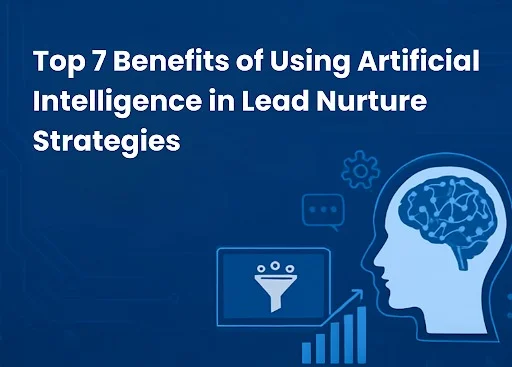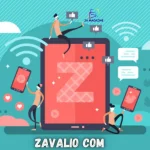In today’s world of B2B marketing and selling, leads are only useful to the seller if your marketing goes beyond just extracting one. The real value to the seller lies in nurturing the prospects through the various steps of the sales funnel and closing the sale, which is a b2b lead nurturing process. Most nurture programs face challenges in a few fundamental pillars: personalization, timing, and scalability of the strategies. It is in such situations that such programs must consider Artificial Intelligence (AI), which changes the process of engaging and communicating, and trust-building for prospects at various funnel stages in your nurture strategies.
AI is no longer just about automation and simplification of nurturing programs. It also engages with buyer intent behaviors, predictions, and ultimate actions to design smart, nurturing touchpoints, which, in effect, are situation-relevant and reach the buyers when and where they are making buying decisions. The reality is that Agentic AI in demand gen is forcing B2B marketers to revise their lead nurturing strategies with more emphasis on dynamic marketing and less on static workflows.
In this article, we’ll unpack the persistent AI-driven lead nurture strategies for B2B marketing and sellin,g and why B2B marketing and selling in the modern world must understand how to use AI.
Dive deeper into insights that connect directly with your interests — Related Reads!
1. Hyper Personalization at Scale
Personalization has always been crafted over b2b lead nurturing that’s effective. AI removes the need to manually tailor content for thousands of leads, which is impossible.
By evaluating vast amounts of consumer data, including browsing patterns, previous interactions, demographics, and intent signals, artificial intelligence (AI) makes hyper-personalization possible. This enables companies to use the appropriate channel to offer the appropriate content at the appropriate moment.
2. Increased Accuracy in Lead Scoring
Conventional lead scoring often relies on human judgment and predetermined guidelines, which may not always accurately reflect actual buyer intent. AI uses machine learning models and predictive analytics to transform this process.
Using AI-powered lead scoring:
- Every action a lead performs (such as clicking an email, browsing a pricing page, or participating in a webinar) is tracked and evaluated.
- The technology recognizes patterns and forecasts which leads are likely to convert.
Sales teams can now shift focus to high-value prospects while Marketing nurtures prospects who are not quite ready to engage. In the end, effective lead scoring improves sales and marketing productivity and Return on Investment (ROI).
3. Automated Multi-Channel Engagement
Leads communicate with companies using a variety of platforms, including websites, chatbots, webinars, social media, and email. Without automation, maintaining consistent communication across all these touchpoints can be very difficult.
AI completes multi-channel engagement in a few steps:
- Personalized, tailored follow-up emails.
- Chatbots that instantly address qualifying FAQs and lead capture.
- Real-time engagement via integrated social media listening tools.
For B2B companies, this translates to engagement all along a prospect’s journey without the deluge of non-targeted and copy-paste messages.
4. Buyer Intent Detection and Predictive Insights
One of the biggest challenges in nurturing leads in the b2b space is knowing exactly when a lead is ready to make a purchase. Intent data is predictive analytics, and in this case, Artificial Intelligence (AI) solves this problem.
5. Improved Content Suggestions
While leads are nurtured through content, delivering content that does not pertain to the subject matter can be detrimental. AI-driven recommendation engines help to alleviate this problem by analyzing user activity and determining the most valuable pieces.
By providing tailored content paths, AI not only guides their personas through the content but also builds long-lasting relationships as trust and educational value are reinforced until the final conversion.
This is where Agentic AI in demand gen shifts the paradigm for how demand generation is done. It not only responds to user behavior but also dynamically adjusts nurture paths, content curation, and sequence optimization in real-time. The result is seamless and more intelligent journeys than legacy automation can provide.
6. Efficiency (Time & Cost)
Executing AI lead nurture programs considerably lowers the manual work involved. No longer do marketers have to spend hours manually segmenting email lists, creating follow-up schedules, or reviewing reports.
AI handles all of these tasks, some of which include:
- Spending time finishing tasks to make an operational flow.
- Guiding the group on how to spend time on original ideas.
- Lowering total expenditure on the campaign and at the same time, enhancing results.
To sum up, businesses work on less and get more due to the ROI maximization on B2B lead nurturing strategies harnessed from AI.
7. Continuous Optimization Through Data Insights
Traditional campaigns depend upon scheduled reports and don’t change until new data is available. AI literally does the opposite. Machine learning models track the performance of the campaigns in real-time and continuously learn, adapting paradigms to recommend improvements.
- For instance, AI can test different subject lines if the current one isn’t getting enough clicks.
- AI can reallocate leads to more productive sequences if a specific lead nurture method isn’t converting.
For example:
Within demand generation this is equally true, but the addition of Agentic AI in this case walks the initiative further to permit intelligent, self-optimizing systems which do not require human supervision. This level of autonomy is ensured so that nurture campaigns are permanent, continuously dynamically enriched and relevant, and highly effective.
Final Thoughts
Artificial Intelligence is extremely important to the present day business to business lead nurturing strategy and a big part of its success comes from hyper-personalization and predictive insights driven by the AI algorithms and technology.
With the rise of agentic AI, demand generation is now able to provide even more sophisticated predictive nurturing by enabling B2B marketers to develop even more sophisticated adaptive nurture programs that learn and refine themselves to provide even more sophisticated nurturing interactions.
Companies adopting AI technology into their lead production and nurture systems get elevated customer engagement and retention rates in addition to better conversion rates from nurturing policies. With every customer expecting more personalized interactions, AI solution is the only way to go.
Spotlight on excellence: explore our featured posts for fresh, compelling content today!







